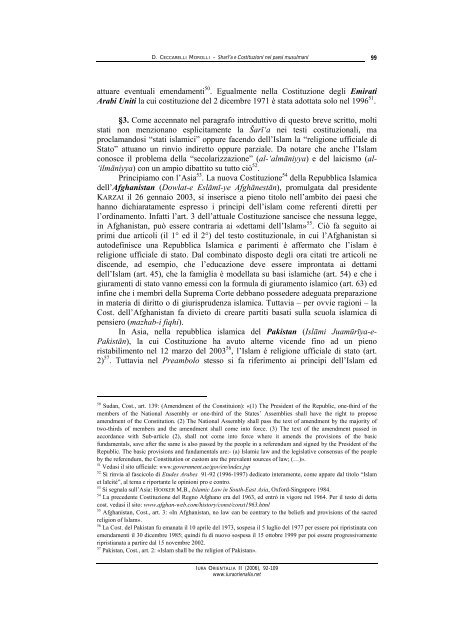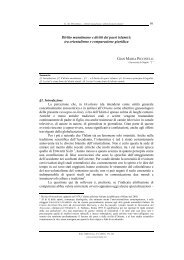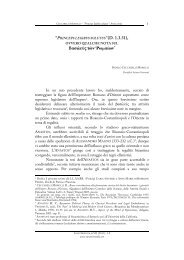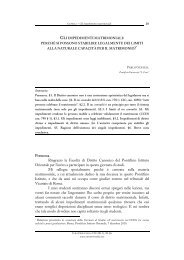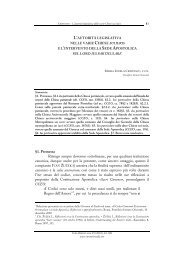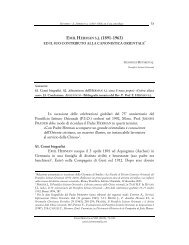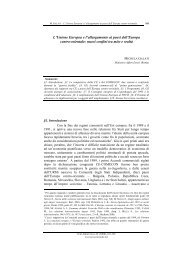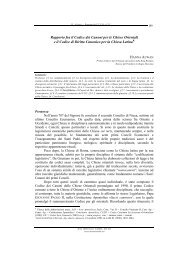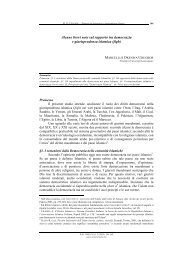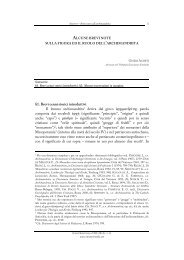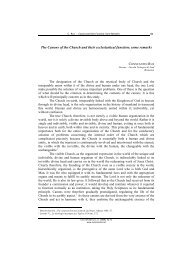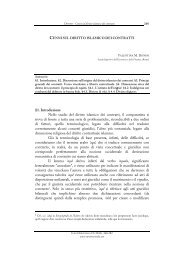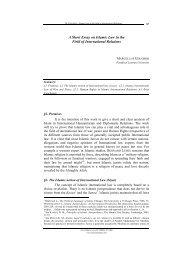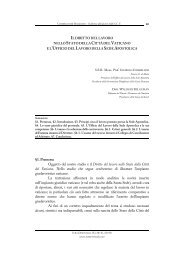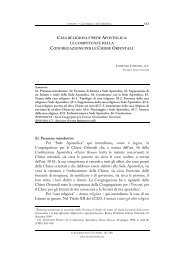di Danilo Ceccarelli Morolli - iura orientalia
di Danilo Ceccarelli Morolli - iura orientalia
di Danilo Ceccarelli Morolli - iura orientalia
Create successful ePaper yourself
Turn your PDF publications into a flip-book with our unique Google optimized e-Paper software.
D. CECCARELLI MOROLLI – Sharî’a e Costituzioni nei paesi musulmani99attuare eventuali emendamenti 50 . Egualmente nella Costituzione degli EmiratiArabi Uniti la cui costituzione del 2 <strong>di</strong>cembre 1971 è stata adottata solo nel 1996 51 .§3. Come accennato nel paragrafo introduttivo <strong>di</strong> questo breve scritto, moltistati non menzionano esplicitamente la Šarī‘a nei testi costituzionali, maproclamandosi “stati islamici” oppure facendo dell’Islam la “religione ufficiale <strong>di</strong>Stato” attuano un rinvio in<strong>di</strong>retto oppure parziale. Da notare che anche l’Islamconosce il problema della “secolarizzazione” (al-‘almāniyya) e del laicismo (al-‘ilmāniyya) con un ampio <strong>di</strong>battito su tutto ciò 52 .Principiamo con l’Asia 53 . La nuova Costituzione 54 della Repubblica Islamicadell’Afghanistan (Dowlat-e Eslāmī-ye Afghānestān), promulgata dal presidenteKARZAI il 26 gennaio 2003, si inserisce a pieno titolo nell’ambito dei paesi chehanno <strong>di</strong>chiaratamente espresso i principi dell’islam come referenti <strong>di</strong>retti perl’or<strong>di</strong>namento. Infatti l’art. 3 dell’attuale Costituzione sancisce che nessuna legge,in Afghanistan, può essere contraria ai «dettami dell’Islam» 55 . Ciò fa seguito aiprimi due articoli (il 1° ed il 2°) del testo costituzionale, in cui l’Afghanistan siautodefinisce una Repubblica Islamica e parimenti è affermato che l’islam èreligione ufficiale <strong>di</strong> stato. Dal combinato <strong>di</strong>sposto degli ora citati tre articoli ne<strong>di</strong>scende, ad esempio, che l’educazione deve essere improntata ai dettamidell’Islam (art. 45), che la famiglia è modellata su basi islamiche (art. 54) e che ig<strong>iura</strong>menti <strong>di</strong> stato vanno emessi con la formula <strong>di</strong> g<strong>iura</strong>mento islamico (art. 63) e<strong>di</strong>nfine che i membri della Suprema Corte debbano possedere adeguata preparazionein materia <strong>di</strong> <strong>di</strong>ritto o <strong>di</strong> giurisprudenza islamica. Tuttavia – per ovvie ragioni – laCost. dell’Afghanistan fa <strong>di</strong>vieto <strong>di</strong> creare partiti basati sulla scuola islamica <strong>di</strong>pensiero (mazhab-i fiqhi).In Asia, nella repubblica islamica del Pakistan (Islāmi Juamūrīya-e-Pakistān), la cui Costituzione ha avuto alterne vicende fino ad un pienoristabilimento nel 12 marzo del 2003 56 , l’Islam è religione ufficiale <strong>di</strong> stato (art.2) 57 . Tuttavia nel Preambolo stesso si fa riferimento ai principi dell’Islam ed50 Sudan, Cost., art. 139: (Amendment of the Constituion): «(1) The President of the Republic, one-third of themembers of the National Assembly or one-third of the States’ Assemblies shall have the right to proposeamendment of the Constitution. (2) The National Assembly shall pass the text of amendment by the majority oftwo-thirds of members and the amendment shall come into force. (3) The text of the amendment passed inaccordance with Sub-article (2), shall not come into force where it amends the provisions of the basicfundamentals, save after the same is also passed by the people in a referendum and signed by the President of theRepublic. The basic provisions and fundamentals are:- (a) Islamic law and the legislative consensus of the peopleby the referendum, the Constitution or custom are the prevalent sources of law; (…)».51 Vedasi il sito ufficiale: www.government.ae/gov/en/index.jsp52 Si rinvia al fascicolo <strong>di</strong> Etudes Arabes 91-92 (1996-1997) de<strong>di</strong>cato interamente, come appare dal titolo “Islamet laïcité”, al tema e riportante le opinioni pro e contro.53 Si segnala sull’Asia: HOOKER M.B., Islamic Law in South-East Asia, Oxford-Singapore 1984.54 La precedente Costituzione del Regno Afghano era del 1963, ed entrò in vigore nel 1964. Per il testo <strong>di</strong> dettacost. vedasi il sito: www.afghan-web.com/history/const/const1963.html55 Afghanistan, Cost., art. 3: «In Afghanistan, no law can be contrary to the beliefs and provisions of the sacredreligion of Islam».56 La Cost. del Pakistan fu emanata il 10 aprile del 1973, sospesa il 5 luglio del 1977 per essere poi ripristinata conemendamenti il 30 <strong>di</strong>cembre 1985; quin<strong>di</strong> fu <strong>di</strong> nuovo sospesa il 15 ottobre 1999 per poi essere progressivamenteripristianata a partire dal 15 novembre 2002.57 Pakistan, Cost., art. 2: «Islam shall be the religion of Pakistan».IURA ORIENTALIA II (2006), 92-109www.<strong>iura</strong>orienalia.net


